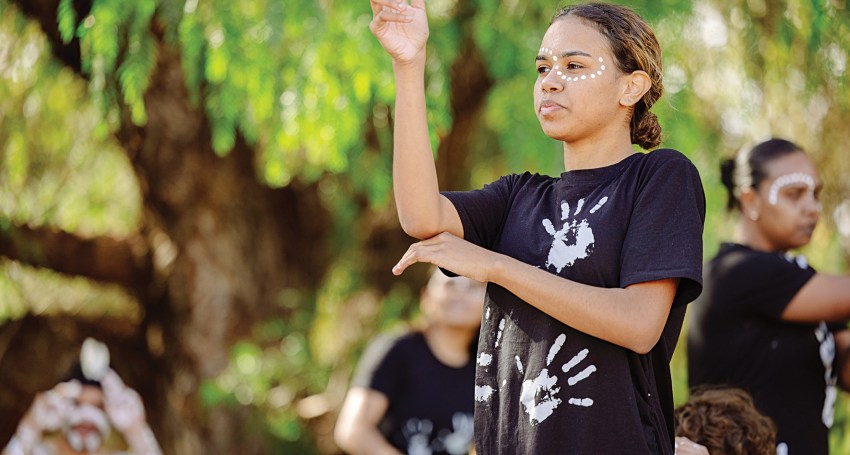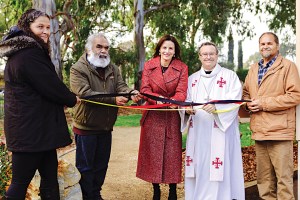Walking a new path
Events
The launch of a new chapter in the history of the Otherway Centre was an opportunity to reflect on the past, as Centacare Catholic Community Services brought people together for a special NAIDOC Week celebration.

The official opening of a healing garden at the Stepney site and the unveiling of the centre’s new name, Ngani Pari-Arra Cultural Centre, took place on July 10 as part of the first ever NAIDOC event in the eastern suburbs.
Ngani Pari-Arra means ‘Being together near the river’ and reflects the location of the centre alongside Second Creek, which has run through Kaurna land for thousands of years.
Centacare executive director Leanne Haddad described the renaming as a “deliberate act of renewal” and a commitment to walking a new path with community.
“We honour our past by working alongside Aboriginal communities to build a stronger future,” Ms Haddad said.
“Ngani Pari-Arra is not just a name change – it is a re-grounding in place, identity and cultural authority.”
The Otherway Centre was established in the early 1980s in Pirie Street, city, where it quickly became a vibrant community hub.
Supported by the Aboriginal Catholic Ministry, the centre was shaped by Aboriginal community leaders, elders and families, in particular Aunty Shirley Peisley AM and Leila Rankine, whose families attended the launch last month.
In the early 1990s, the Otherway Centre relocated to a purpose-adapted facility on Payneham Road, Stepney, near the Church of the Holy Name. Mass is celebrated weekly by Fr James McEvoy in the St Martin de Porres Chapel housed in the Otherway Centre.

From left, Danica Davidson, Centacare First Nations coordinator, Uncle Les Wanganeen, Cressida O’Hanlon MP, Archbishop O’Regan and Kel Rankine, Centacare Aboriginal Services coordinator at the opening of the healing garden.
Archbishop Patrick O’Regan, local MP Cressida O’Hanlon and Uncle Les Wanganeen, Centacare’s inaugural Uncle in Residence, officially opened the healing garden in a ribbon-cutting ceremony.
The garden was designed in consultation with community members by Kaurna, Ngarrindjeri, Yankunytjatjara artist Allan Sumner from Aboriginal Contemporary Arts.
“This garden is more than just plants and pathways,” Allan said.
“It’s about connection – to Country, to culture and to each other.”
Archbishop O’Regan said land and culture were “not disposable but foundational”.
“We proclaim that the Indigenous voice must not only be heard but centred,” he told the gathering.
“Scripture reminds us that land is never a possession, but a gift entrusted to us…The Kaurna people have been faithful custodians of this land since time immemorial, honouring its rhythms, protecting its creeks and sharing its story. Our role is not to override that story, but to reverently join it.
“As the Church in Adelaide, we recommit ourselves to walking this journey – not as guests, but as partners. Not as saviours, but as friends. We acknowledge that the Church has not always walked justly. Yet today, we choose to walk differently. We choose the Otherway.”
Archbishop O’Regan said the presence of Second Creek was a reminder of “the living waters promised by Christ”: ‘Whoever drinks of the water that I shall give will never thirst’. In this Centre, many have found such water – the kind that sustains dignity, heals wounds and renews life.’
“In this Year of Jubilee for our Church, let us remember that the true Jubilee is proclaimed when liberty is restored, when land is healed, and when communities are restored to joy,” he said.
Katrine Hildyard, Minister for Child Protection, Minister for Women and the Prevention of Domestic, Family and Sexual Violence, and Dale Agius, Commissioner for Aboriginal Children and Young People also attended the event.
The renaming of the main hall at Stepney as the Aunty Leila Rankine Otherway Hall and the office rooms as the Aunty Shirley Peisley Rooms pay tribute to the two Aboriginal women whose leadership was instrumental in the centre’s early years.

Jamie-Lee Mann, Caitlin, Dylan Peisley and Mabel Peisley.
Dylan Peisley remembered spending many of his childhood days with his grandmother at the Otherway Centre in the city and at Stepney.
“We spent a lot of time here as kids,” Dylan said.
“We came with our family to events – Reconciliation and NAIDOC Week services, community gatherings and celebrations, biggest feeds, running around with cousins, smoking ceremonies, even discos held in the old Otherway Centre in the city.
“The Otherway Centre was more than a church – it was a place of connection, of community, of gathering.
“A place where everyone was celebrated and loved. A place where we caught up with family.
“We came because Nanna – alongside people like Uncle John Lochowiak and others – made this place welcoming for us all.”
Dylan said while he was grateful his grandmother was being honoured, he wanted to remind people that her work was “not done”.
“Her fight for our people is not over,” he said.
“Our people are still being killed in custody. Still dying far younger than non-Aboriginal people. Still facing discrimination in the workplace. Still facing disadvantage in education and healthcare.
“Please continue the work that needs to be done. The work Nan was doing. The work that must continue so that our people can live happy, safe, and liberated lives – free from prison violence and police harassment, where our kids can thrive in schools and where we have equal access to quality health care.
“Because this is what Nan would have wanted. She would have wanted us all to continue the work she loved so deeply.”
Various Aboriginal groups were represented at the expo through stalls and activities while Barkindji woman Nancy Bates and Dusty Feet Mob provided entertainment.
Aboriginal Catholic Ministry celebrates weekly Mass in St Martin de Porres Chapel at Stepney on Sunday at 11am.











